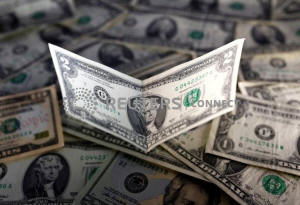Take Five: Dollar darling. World markets themes for the
week ahead
 Send a link to a friend
Send a link to a friend
 [April 27, 2019]
(Reuters) - Following are five big themes
likely to dominate thinking of investors and traders in the coming week
and the Reuters stories related to them. [April 27, 2019]
(Reuters) - Following are five big themes
likely to dominate thinking of investors and traders in the coming week
and the Reuters stories related to them.
1/DOLLAR JUGGERNAUT
The dollar has zipped to near two-year highs, leaving many scratching
their heads. To many, it's down to signs the U.S. economy is chugging
ahead while the rest of the world loses steam. After all, Wall Street is
busily scaling new peaks day after day.
Never mind the cause, the effect is stark. The euro has tumbled to
22-month lows against the dollar and investors are preparing for more,
buying options to shield against further downside. Emerging-market
currencies are also in pain, with Turkish lira and Argentine peso both
sharply weaker.
Now U.S. data need to keep surprising on the upside or even just meet
expectations. The International Monetary Fund sees U.S. growth at 2.3
percent this year. For Germany, the forecast is 0.8 percent. The U.S.
economy's rude health has given rise to speculation the Fed might resume
raising interest rates. Unlikely. But as other countries -- Canada,
Sweden and Australia are the latest -- hint at more policy easing, there
seems to be one way the dollar can go. Up.
(GRAPHIC: Dollar outperforms G10 FX -
https://tmsnrt.rs/2Dz17S5)

2/FED: UP OR DOWN?
Wall Street is near record highs and recession worries are receding, so
as we mentioned above, investors might wonder if the Federal Reserve
will start raising rates again.
Such a pivot is unlikely after the Fed killed off rate-rise expectations
at its March meeting. And the latest Reuters poll all but puts to bed
any risk of rates will go up this economic cycle, given inflation
remains below the Fed's alarm threshold and unemployment is the lowest
in generations.
Before the March rate-pause announcement, a preponderance of economists
penciled in one or more increases this year. But that has flipped. A
majority of those surveyed April 22-24 see no further tightening through
December and more are leaning toward a cut by the end of next year.
Indeed, interest rate futures imply Fed Funds will be below the current
2.25-2.50 percent target range by this December.
Recent positive consumer spending and exports data have eased market
concerns of a sharp economic slowdown. But inflation probably needs to
run hot for a long period to panic policymakers off their wait-and-see
course.
3/HEISEI TO REIWA
Next week ends three decades of Japan's Heisei era. Heisei, or Achieving
Peace, began in 1989 near the peak of a massive stock market bubble and
closes with the country trapped in low growth, no inflation, and
negative interest rates.
The new era that dawns on May 1 is called Reiwa, meaning Beautiful
Harmony. It begins when Crown Prince Naruhito ascends the Chrysanthemum
Throne. But do investors really want harmony? What they want to see is a
bit of economic growth and inflation to shake up the status quo.
The Bank of Japan's stimulus toolkit to revive a long-suffering economy
is anything but harmonious and yet it's set to stay. The central bank
confirmed recently rates will stay near zero for a long time. But the
coming days may not be harmonious or peaceful for currency markets. A
10-day Golden Week holiday kicks off on April 29 and investors are
fretting over the risk of a "flash crash" - a violent currency spasm
that can occur in times of thin trading turnover.
[to top of second column] |

U.S. dollar notes are seen in this November 7, 2016 picture
illustration. Picture taken November 7. REUTERS/Dado Ruvic/Illustration

The year has already seen two yen spikes and many, including Japan's
housewife-trader brigade - so-called Mrs Watanabes - appear to have bought yen
as the holiday approaches. Their short dollar/long yen positions recently
reached record highs, stock exchange data showed.
4/EARNING TURNING
Quarterly earnings were supposed to be the worst in Europe in almost three
years, but with a third of results in, things are looking a little rosier.
Two-thirds of companies' results have beat expectations, and they point to
earnings growth of 4.5 percent year-on-year. Financials have delivered the
biggest surprises, according to analysis by Barclays.
That might just show how low expectations were. In fact, analysts are still
taking a red pen to their estimates.
The latest I/B/E/S data from Refinitiv shows analysts on average expect
first-quarter earnings-per-share for STOXX 600-listed companies to fall 4.2
percent. That would be their worst quarter since 2016 and down sharply from an
estimated 3.4 percent just a week earlier.
Those estimates may end up being a little too bearish as earnings season goes
on, quelling worries that Europe is heading toward a corporate recession.
GSK and Reckitt Benckiser will give the market a glimpse of the health of the
consumer products market and spending on everything from toothpaste, washing
powder and paracetamol.
5/WAITING FOR THE OLD LADY
Sterling has gone into the doldrums amid the Brexit delay and unproductive talks
between the UK government and the opposition Labour party on a EU withdrawal
deal. The resurgent dollar, meanwhile, has taken 2 percent off the pound in
April. It is unlikely the Bank of England will be able to rouse it at its May 2
meeting.
Despite robust retail and jobs data of late, the economic picture is gloomy -
2019 growth is likely to be around 1.2 percent, the weakest since 2009,
investment is down and Governor Mark Carney says business uncertainty is
"through the roof".

Indeed, expectations for an interest rate increase have been whittled down;
Reuters polls forecast rates will not move until early 2020, a calendar quarter
later than was forecast a month ago. The hunt for a new governor to replace
Carney in October adds more uncertainty to the mix.
The recent run of UK data has fueled hopes of economic rebound. That's put net
hedge fund positions in the pound into positive territory for the first time in
nearly a year. The Old Lady of Threadneedle Street might temper some of that
optimism.
(Reporting by Alden Bentley in New York, Vidya Ranganathan in Singapore; Karin
Strohecker, Josephine Mason and Saikat Chatterjee in London; compiled by Sujata
Rao; edited by Larry King)
[© 2019 Thomson Reuters. All rights
reserved.] Copyright 2019 Reuters. All rights reserved. This material may not be published,
broadcast, rewritten or redistributed.
Thompson Reuters is solely responsible for this content. |